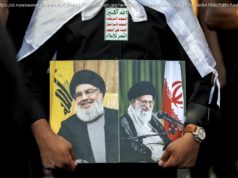WASHINGTON (AP) — The Latest on the Senate hearings on Supreme Court nominee Brett Kavanaugh (all times local): 7 p.m. Republican Sen. Jeff Flake of…
WASHINGTON (AP) — The Latest on the Senate hearings on Supreme Court nominee Brett Kavanaugh (all times local):
7 p.m.
Republican Sen. Jeff Flake of Arizona tried not once, but twice, to engage Brett Kavanaugh in questions arising from one of President Donald Trump’s tweets, but the Supreme Court nominee declined to respond.
Flake said he was concerned about the executive branch and asked whether a president should be able to use his authority to carry out directives for political gain. He specifically referred to Trump’s tweet against Attorney General Jeff Sessions on Monday, where he complained that criminal charges against two Republican congressmen could hurt the party in the midterm election.
Kavanaugh said maintaining judicial independence «requires me to avoid commenting on current events.»
Flake then took Trump out of the question. Kavanaugh still declined to engage in a hypothetical he said closely resembled the earlier one.
__
6:10 p.m.
Supreme Court nominee Brett Kavanaugh is declining to say whether he would recuse himself from cases involving the civil or criminal liability of President Donald Trump.
Kavanaugh told Sen. Richard Blumenthal of Connecticut that he wouldn’t comment on how he would handle any particular case, adding that even «the decision to participate in a case is itself a decision» he would not prejudge.
«This is part of what I see as independence of the judiciary,» Kavanaugh says, noting that the senator may disagree.
«I do disagree,» Blumenthal said, «and I am troubled.»
Blumenthal began his questioning by saying he wanted to address the «unchartered territory» of a high court nominee from a president who is an unindicted co-conspirator in a federal criminal case that could come to the court.
__
5:30 p.m.
Supreme Court nominee Brett Kavanaugh is pushing back against a senator’s suggestion that he’s opposed to investigating or prosecuting a sitting president, despite having said in 2016 that he’d «put a nail» in a ruling that upheld an independent counsel law.
Kavanaugh says his objection to the Morrison v. Olson ruling only extends to the independent counsel law, which Congress did away with in 1999, not the current special counsel law. That’s the law that’s underpinning special counsel Robert Mueller’s Russia investigation.
Pressed by Sen. Chris Coons of Delaware for his views on the breadth of executive power, Kavanaugh says he wanted to «avoid melding a lot of different things.»
Kavanaugh insists if such questions come before him on the court he’ll have an «an open mind.»
__
5:15 p.m.
Supreme Court nominee Brett Kavanaugh says he stopped voting shortly after becoming a federal appeals court judge in 2006.
Republican Sen. Ted Cruz asked Kavanaugh on Wednesday whether he considers himself a «Republican judge.» Kavanaugh responded he believes he voted in one election as a judge and wasn’t sure what his voter registration says.
Kavanaugh says he read about Supreme Court Justice John Marshall Harlan II, who didn’t vote as a federal judge. He says he thought Harlan’s practice was a «good model for a federal judge» to follow.
He says, «It seemed to me that voting is a very personal expression of your policy beliefs in many ways and your personal beliefs.»
Kavanaugh previously noted his decision to stop voting in a 2016 law review article.
__
3:50 p.m.
Supreme Court nominee Brett Kavanaugh says he has not taken a position on the constitutionality of investigating a sitting president. Yet his past writings cast doubt on the idea.
Asked by Sen. Amy Klobuchar Wednesday whether he believes such investigations are only acceptable in impeachment proceedings, Kavanaugh replied: «I did not take a position on the constitutionality. Period.»
In a footnote to a 2009 law review article, Kavanaugh wrote that «a serious constitutional question exists regarding whether a President can be criminally indicted and tried while in office.»
A decade earlier, Kavanaugh wrote that the Constitution seems to dictate that «congressional investigation must take place in lieu of criminal investigation when the President is the subject of investigation, and that criminal prosecution can occur only after the President has left office.»
__
2:25 p.m.
President Donald Trump says he’s been watching the Senate confirmation hearings of his Supreme Court nominee Brett Kavanaugh. He says the judge has «an outstanding intellect.»
Speaking to reporters in the Oval Office as he welcomes the emir of Kuwait to the White House, Trump says he’s «happy» with the way the proceedings are going.
Trump says he «saw some incredible answers to very complex questions,» when he tuned in to the proceedings. Trump called Kavanaugh «an outstanding judge» who was «born for the position.»
Kavanaugh was questioned before the Senate Judiciary Committee Wednesday.
Trump says Democrats are «grasping at straws» in their questioning of Kavanaugh.
__
2:05 p.m.
Senate Republicans have been forced to adjourn the Senate to continue the confirmation hearing for Supreme Court nominee Brett Kavanaugh.
Senate Minority Leader Chuck Schumer objected to a request from Majority Leader Mitch McConnell to allow Kavanaugh’s hearing to continue past 2 p.m. Wednesday. Under Senate rules, the minority leader must agree before a hearing can extend two hours past the opening of the Senate. The chamber opened at noon on Wednesday.
Schumer objected, protesting that Republicans are holding back records from Kavanaugh’s time in government.
Rather than allowing Kavanaugh’s hearing to end at 2 p.m., McConnell adjourned the Senate. The confirmation hearing is expected to last into the late evening.
Earlier in the day, liberal groups blasted Schumer’s handling of the Supreme Court fight, declaring, «you are failing us.»
___
12:25 p.m.
Supreme Court nominee Brett Kavanaugh is denying that he misled senators in testimony when he was nominated to be an appellate judge in 2006. He says the testimony was «100 percent accurate.»
The response does not appear to have satisfied Democratic Sen. Patrick Leahy of Vermont. Leahy is suggesting that confidential documents not available to the public may contradict Kavanaugh’s assertions that he knew nothing about a Bush administration warrantless surveillance program or efforts by a Republican Judiciary Committee aide to steal material from Democrats in advance of judicial nomination hearings.
Judiciary Chairman Chuck Grassley said he would consider making the documents public in time for Leahy’s next round of questions Thursday.
Kavanaugh’s response came after an unusual moment where Democrats played a video clip of Kavanaugh’s 2006 testimony.
___
12:15 p.m.
Supreme Court nominee Brett Kavanaugh is declining to answer questions about the extent of the president’s pardon power.
Democratic Sen. Patrick Leahy of Vermont asked Kavanaugh: «President Trump claims he has an absolute right to pardon himself. Does he?»
Kavanaugh responded that the question was a hypothetical one he «can’t begin to answer in this context as a sitting judge and as a nominee to the Supreme Court.»
Leahy followed by asking whether the president has the ability to pardon someone in exchange for a promise not to testify against him. Kavanaugh declined to answer.
Leahy concluded by saying: «I hope for the sake of the country that remains a hypothetical question.»
President Donald Trump has declined to rule out pardons for people convicted in special counsel Robert Mueller’s Russia investigation.
___
11:35 a.m.
Supreme Court nominee Brett Kavanaugh says he knew nothing about the sexual misconduct allegations against a judge who was a friend and mentor.
Kavanaugh said Wednesday that when the allegations against former federal appeals court judge Alex Kozinski became public, they were a «gut punch» for him and for the federal judiciary. Asked whether he knew about the allegations before they became public, Kavanaugh responded: «nothing.» He said he was «shocked and disappointed.»
Asked whether he was on an email list that Kozinski used to send offensive material, Kavanaugh responded: «I don’t remember anything like that.»
Kozinski retired in December after several female former law clerks and colleagues accused him of sexual misconduct.
Kavanaugh clerked for Kozinski, and Kozinski introduced him during his 2006 confirmation hearing to be a judge.
___
11:20 a.m.
Supreme Court nominee Brett Kavanaugh is refusing to say whether a president can be forced to testify in a criminal case, calling it a hypothetical.






